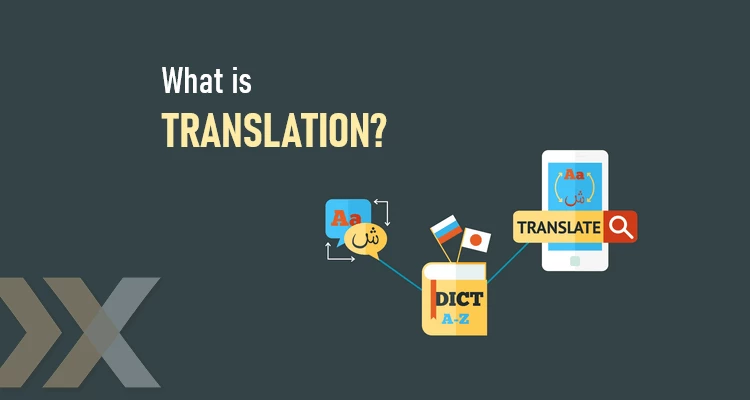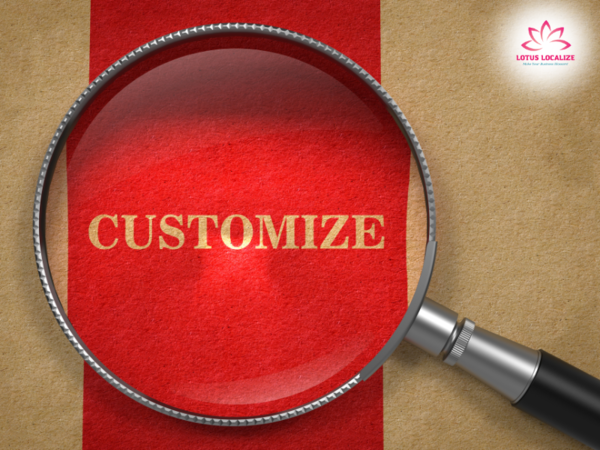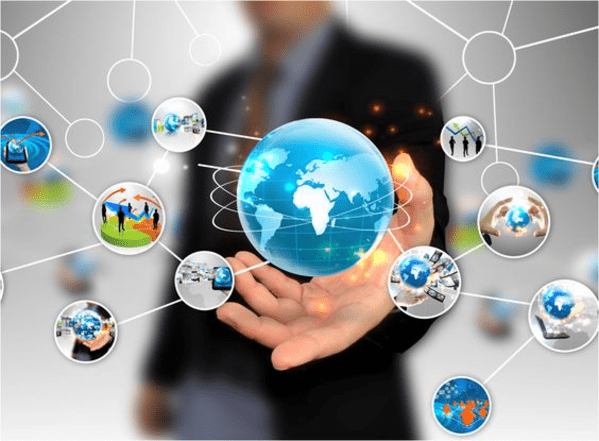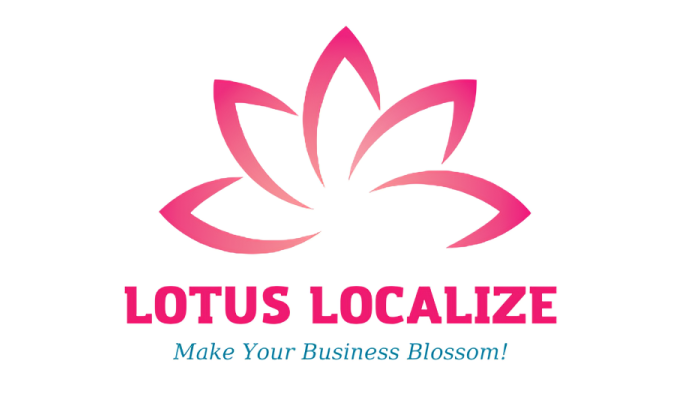
The power of neuroscience translation in global scientific progress
Neuroscience translation is one of the most exciting and rapidly advancing fields in science, with groundbreaking discoveries that hold the potential to revolutionize our understanding of the brain and human behavior. However, the power of these discoveries can only be fully realized when shared globally. In this article, we explore the importance and challenges of neuroscience translation in advancing the collective knowledge of the scientific community.
What are neuroscience translation services?
Neuroscience translation services specialize in translating scientific documents, research papers, clinical trials, and other materials related to the field of neuroscience. These services ensure that complex, highly specialized content in neuroscience is accurately and effectively communicated across different languages, enabling global collaboration and knowledge-sharing within the scientific community.
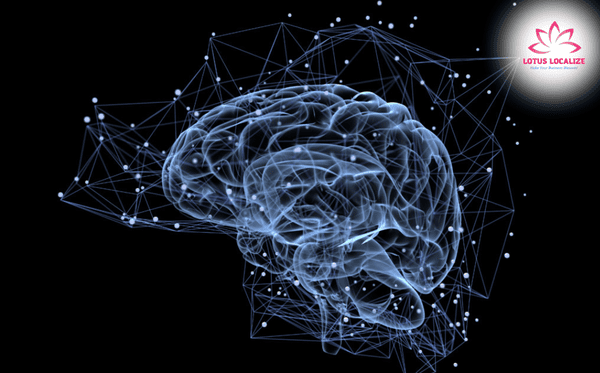
Key aspects of neuroscience translation services include:
- Accurate terminology: Neuroscience involves highly technical and specific terminology. Translators must have a deep understanding of the field to ensure that terms related to brain function, neurological disorders, and research methods are correctly translated.
- Cultural sensitivity: Scientific findings often need to be communicated in a way that is relevant to different cultural contexts. Translators ensure that the information is accessible and appropriately tailored to different audiences, including researchers, clinicians, and patients.
- Confidentiality and precision: Given the importance of accuracy in medical and scientific contexts, neuroscience translation services ensure that sensitive information, such as research data or patient-related documents, is handled with the utmost confidentiality and precision.
- Clinical and research documents: These services cover a wide range of materials, including research articles, medical journals, clinical trial reports, and conference presentations, all of which play a critical role in advancing neuroscience globally.
By providing accurate and culturally relevant translations, neuroscience translation services contribute to the dissemination of knowledge, accelerating advancements in the field and fostering international collaboration.
Read more: How veterinary translation ensures your pet gets the best treatment
Why neuroscience document translation is essential?
Neuroscience translation is essential for several reasons, all of which contribute to the advancement of global scientific progress and medical practice:
Global collaboration: Neuroscience research is a global effort, with studies and breakthroughs occurring in different countries and languages. Translation ensures that scientific findings are accessible to researchers worldwide, promoting international collaboration and the exchange of knowledge.
Dissemination of knowledge: The rapid pace of discoveries in neuroscience means that timely dissemination of information is critical. Translating research papers, clinical trials, and other materials into multiple languages ensures that findings reach a wider audience, including medical professionals, researchers, and educators, facilitating faster adoption of new knowledge.
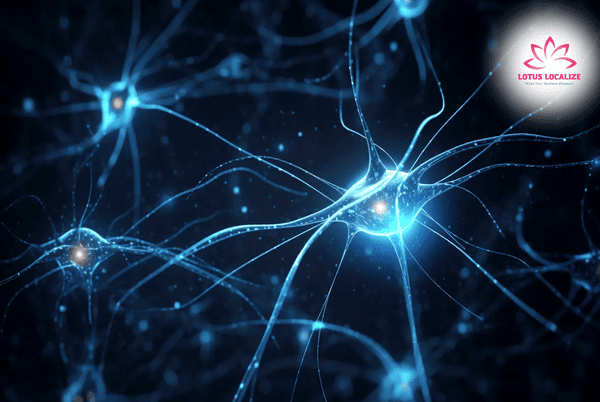
Accurate communication: Neuroscience involves complex, specialized terminology that must be communicated accurately to prevent misunderstandings. Professional neuroscience translators possess the knowledge and expertise to translate technical terms with precision, maintaining the integrity of the original content.
Improved healthcare and treatment: Translating clinical research, medical protocols, and patient information allows healthcare professionals across different regions to implement the latest neuroscience-based treatments and therapies, ultimately improving patient care and outcomes worldwide.
Cultural sensitivity: Different regions may have varying healthcare systems, cultural perspectives, and patient needs. Translation services ensure that neuroscience-related materials are culturally relevant and sensitive, making research and clinical practices more accessible and applicable to diverse populations.
Ethical and legal compliance: In some cases, such as clinical trials or drug testing, translation is essential to comply with international regulations and ethical guidelines. Proper translation ensures that informed consent documents, regulatory submissions, and other materials are clear and understandable, protecting both patients and researchers.
Neuroscience translation plays a vital role in ensuring that the latest discoveries, treatments, and knowledge are shared across borders, enabling progress in the field and improving global healthcare.
Who needs neuroscience translation services?
Neuroscience document translation services are essential for a variety of individuals and organizations involved in the field of neuroscience, as accurate communication across languages is critical for the advancement of research, patient care, and global collaboration. Here are some key groups who require neuroscience translation services:
Researchers and academic institutions
Neuroscientists and academic institutions involved in neurobiology, cognitive science, or neurological research often need to publish findings in international journals or present at global conferences. Translating research papers, articles, and posters ensures their work reaches a broader audience and facilitates cross-border collaborations.

Healthcare providers and medical institutions
Doctors, clinicians, hospitals, and healthcare organizations that specialize in neurology or psychiatry need translations for patient records, clinical trial documents, treatment guidelines, and educational materials. Accurate translations help healthcare providers offer better care to diverse patient populations and ensure patients understand medical instructions, treatment options, and consent forms.
Pharmaceutical and biotech companies
Pharmaceutical companies conducting clinical trials for neurological diseases or developing new medications for brain-related conditions often require translations for clinical study protocols, patient recruitment materials, informed consent forms, and regulatory submissions. Accurate translations are crucial for ensuring that clinical trials meet international standards and comply with local regulations.
Regulatory authorities and ethics committees
Regulatory agencies overseeing clinical trials, drug approvals, and medical device certifications need precise translations of trial reports, regulatory documents, and legal documents related to neuroscience. Translating this documentation ensures that it meets local laws and guidelines for approval processes in different countries.
Medical publishers and journals
Publishers and scientific journals involved in the dissemination of neuroscience literature need translation services to make articles, research findings, and clinical guidelines available to a global readership. This helps promote international scientific dialogue and fosters collaboration across linguistic boundaries.

Nonprofit organizations and advocacy groups
Nonprofits focused on neurological disorders, mental health, and brain research require translation services for materials related to awareness campaigns, educational resources, and fundraising efforts. Accurate translations help increase their reach and effectiveness in raising awareness and securing support across different regions and language groups.
Government and public health organizations
Government agencies and public health organizations working on neurological health policies, mental health initiatives, or epidemiological studies may need neuroscience translation services for public reports, surveys, and statistical data. Ensuring these materials are accessible to non-native speakers is critical for widespread understanding and policy implementation.
Medical device and technology companies
Companies producing medical devices, software, or diagnostic tools related to neuroscience, such as brain imaging equipment, neurostimulation devices, or cognitive health apps, require translation services for user manuals, instructions, training materials, and marketing content. These translations ensure their products are accessible and compliant with regulations in various countries.
Patients and patient advocacy groups
Patients, particularly those from non-native English-speaking backgrounds, need accurate translations of medical information related to neurological conditions, treatment options, and clinical trials. Translating patient education materials, consent forms, and support resources ensures that individuals can make informed decisions about their health and treatment plans.
Neuroscience document translation services are essential for a wide range of stakeholders, including researchers, healthcare providers, pharmaceutical companies, regulatory bodies, medical publishers, nonprofits, government organizations, and patients. These services ensure that neuroscience knowledge, research, and advancements are accessible, comprehensible, and usable across different linguistic and cultural contexts, ultimately promoting global progress in brain science and neurological health.
Read more: What is medical localization? Everything you need to know
Challenges in neuroscience translation and how experts solve them
Neuroscience document translation is a complex task due to the specialized nature of the field, the need for precision, and the unique challenges it presents. Here are some of the key challenges faced in neuroscience translation, along with how experts address them:
Complex terminology and technical language
Challenge: Neuroscience is filled with highly technical terms that may not have direct equivalents in other languages. For example, terms related to brain structures, neurological disorders, or neuroimaging techniques are often specific to the scientific community.
Solution: Expert translators in neuroscience have specialized knowledge in both language and the field of neuroscience. They use established glossaries, consult with subject matter experts, and continuously update their knowledge to ensure accurate and consistent translation of terms. They may also create new terms when necessary to ensure clarity in the target language.
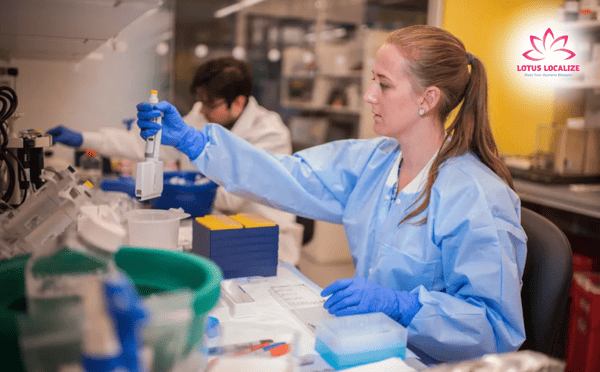
Cultural and linguistic differences
Challenge: Certain concepts in neuroscience, such as mental health issues or neurological conditions, may be viewed or understood differently across cultures. What is commonly known and accepted in one culture may not be the same in another, which could affect the translation’s impact.
Solution: Translators address these cultural nuances by adapting the content to be culturally relevant. They also collaborate with cultural experts to ensure the translation resonates with the target audience while maintaining scientific accuracy. For example, mental health conditions may need to be translated in a way that is culturally sensitive and avoids stigmatization.
Dealing with evolving terminology
Challenge: Neuroscience is a rapidly evolving field, with new discoveries and terms emerging frequently. Translators must stay up to date with the latest developments to ensure they are using the most current and accurate terms.
Solution: Expert translators continuously engage with the latest literature, attend scientific conferences, and take specialized courses to stay informed. They also collaborate with researchers to verify newly coined terms and their appropriate translations.
Legal and ethical compliance
Challenge: Translating neuroscience documents, especially clinical trial data or patient information, requires ensuring that the content adheres to ethical standards and local legal requirements. Missteps can lead to legal consequences or violate patient privacy.
Solution: Neuroscience translation experts are well-versed in medical and scientific regulations, including data protection laws like GDPR or HIPAA. They ensure that translations are compliant with the relevant laws, maintaining confidentiality and following ethical standards in clinical and medical contexts.
Translating scientific literature for non-specialist audiences
Challenge: Translating neuroscience research for broader audiences (e.g., patients, the general public) presents the challenge of making highly technical content understandable without losing its scientific integrity. Solution: When translating for non-specialist audiences, neuroscience translators simplify complex terminology while ensuring that the key scientific message is not lost. They balance readability and accessibility with precision, often working closely with subject matter experts to ensure the content is both accurate and easily digestible.
Neuroscience translation is an essential, yet challenging, task in ensuring the effective exchange of knowledge within the global scientific community. By leveraging their specialized knowledge, staying informed about new developments, and collaborating with experts across disciplines, professional translators can navigate these challenges and provide accurate, culturally sensitive, and legally compliant translations that contribute to global scientific progress.
What makes a neuroscience translation service stand out?
A neuroscience translation service stands out by combining specialized expertise, precision, and cultural sensitivity to ensure the highest quality translations for the field. Here are several key factors that make a neuroscience translation service exceptional:
Specialized knowledge and expertise
Neuroscience is a highly specialized field with complex terminology, concepts, and research methods. A top-notch translation service employs translators with a deep understanding of neuroscience, including familiarity with neurological disorders, brain structures, treatments, and cutting-edge research. This expertise ensures that translations are not only linguistically accurate but also scientifically precise.

Accuracy and consistency
Neuroscience research, clinical documents, and patient information require absolute accuracy. A reliable translation service prioritizes meticulous attention to detail, minimizing the risk of misinterpretation that could have serious consequences. To maintain consistency, expert translation services use translation memory tools and maintain comprehensive glossaries of neuroscience terms, ensuring that terms are translated consistently across different documents and projects.
Cultural and linguistic sensitivity
In neuroscience, certain concepts may have varying cultural significance or understanding. A leading translation service adapts the content to respect cultural differences while maintaining scientific integrity. For example, mental health and neurological conditions may be viewed differently across cultures, so the service ensures that these terms are translated appropriately, fostering understanding and inclusivity.
Adherence to medical and regulatory standards
Neuroscience translation services often deal with clinical trial documentation, medical devices, and patient records, which require strict compliance with legal and ethical standards. The best translation services are well-versed in regulations such as HIPAA, GDPR, and other regional guidelines, ensuring that translations comply with data privacy laws, medical standards, and ethical considerations.
Up-to-date knowledge of scientific advancements
Neuroscience is a fast-evolving field, and the best translation services stay updated on the latest discoveries, terminologies, and trends. They actively follow scientific literature, attend conferences, and collaborate with experts to ensure that their translations reflect the latest terminology and research developments.
Comprehensive quality assurance process
A standout neuroscience translation service follows a rigorous quality assurance process. This includes multiple rounds of proofreading, revision, and validation by subject matter experts. Peer review ensures that translations are both scientifically accurate and linguistically sound, minimizing errors and enhancing the final output’s quality.
What makes a neuroscience translation service stand out is its ability to combine linguistic accuracy with specialized knowledge of neuroscience, a focus on cultural and ethical considerations, and adherence to the highest standards of quality assurance. By offering a comprehensive, secure, and personalized approach, these services play a pivotal role in bridging language barriers and advancing global scientific and medical progress.
Why choose Lotus Localize for your neuroscience translation needs?
At Lotus Localize, we specialize in premium neuroscience translation services tailored to meet the distinct needs of the neuroscience community. Our team of expert translators combines linguistic proficiency with in-depth knowledge of neuroscience, ensuring that every translation is precise, clear, and scientifically accurate.





Let Lotus Localize be your partner in global neuroscience communication!
Choose Lotus Localize for all your neuroscience translation needs. We are dedicated to ensuring your research, findings, and clinical materials are communicated accurately and effectively to a global audience, driving scientific advancement and fostering international collaboration. Whether you’re in research, healthcare, pharmaceuticals, or regulatory affairs, our professional translation services bridge the language gap and support the growth of your work.
Neuroscience translation plays a pivotal role in advancing global scientific progress. By breaking down language barriers, it facilitates the exchange of knowledge, promotes international collaboration, and ensures that groundbreaking research, clinical advancements, and patient care initiatives are accessible to a global audience.
If you have any questions or need assistance with translation services for many industries: life science translation, education translation, technology translation, financial translation, marketing translation, manufacturing translation, government translation,… and interpretation services, localization services: game localization, software localization, website localization,… please contact Lotus Localize immediately at 0866 224 968 or visit the website: lotus-localize.com for advice on the best solutions!
QUALITY PROMISE
Lotus Localize offers consistent, high-quality service delivery in all customer engagements. Our in-house translators and staff adhere to well-established business processes, allowing us to communicate properly, deliver on time, and surpass client expectations.

